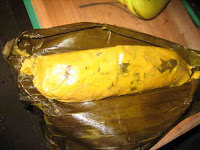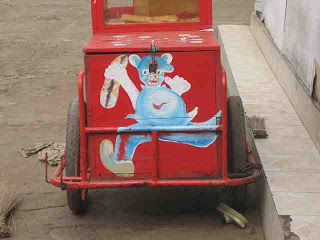When I was getting ready to leave the US, my friends and family mostly worried about my health and safety - was I going to be hacked to pieces by guys with machetes, what poisonous foods would I eat and what horrible diseases would I contract, those sorts of things. No one ever asked about the possibility of job frustration.
When I came to Cameroon I was assigned to teach computers in Peace Corps' education program here. When I was posted to the university I was told my job would be to teach a class called
Informatique de Base (Basic Computing), an introductory level class required of all students.
I was told it was a 60 hour course, so I created a program accordingly. The idea was to start off with the very basics (how to turn on/off a computer, how to use the keyboard and mouse, etc), give a very general overview of the hardware so the students know what a processor or a hard drive is, and then go through Windows and MS Office applications (Word, Excel,
PowerPoint, Access) giving an overview of each with some projects so they could practice the basics in each. Finally there would be a section on the
Internet, how to use search engines and other resources to do research, and how to set up and use an online email account. I spent a lot of time writing lessons and lectures for all of these topics (in French) and also had a lot of ideas for projects in the works that I could assign as homework (for example, when learning excel create an Excel spreadsheet that meets a certain list of criteria, etc so the students can actually apply what I was teaching them).
I thought I had it all thought out. Little did I know ...
The first problem was the number of students. In the past I'm told the course was pretty small - 40 or 50 students maybe. This year they had a big jump in enrollment, so all the first year students signed up, then they decided that all the students in the nursing program needed to take the class, plus a bunch of other students who hadn't taken it before decided to sign up. There was no limit to the number of students
allowed to sign up, so by the time everyone registered (plus students who were showing up and signing the attendance sheets even though they weren't on my list) I counted about 175 students. Because this was far too many to teach at one time, given that the lab only has 18 computers (after we fixed them up - when I first started it only had 6 that worked) I was told to divide them up into 4 groups by majors.
OK, fine. No problem. What this meant though, was that instead of being a 60 hour class it had become a 240 hour class for me, since I would have to teach it four times. Still, no problem. I'm here to teach, let me at 'em. If it takes a while to finish with everyone that's fine.
The second problem was that the University has an unusual system of scheduling classes. Because it is a small school that can't afford a large permanent faculty, they bring in visiting professors from other schools to teach many of their courses. The visitors come for a week or two and teach their courses intensively, often jamming a 60 hour course into a week or two. Because of this system, there is no fixed course schedule. Classes are scheduled on a week to week basis. The schedule for each week is posted the Friday beforehand, which means I rarely know if I'll be teaching, when, and for how long. I've had weeks where I've had no teaching hours assigned and end up with the week off. I've had other weeks where I was scheduled to teach for 28 hours. I normally used my down time to prepare lessons and materials and write documentation for the later parts of the course.
If this was the only problem it would have been manageable, but it was compounded by the fact that we only have one computer lab. Since the University offers Computer Science as a major, this means that
Informatique de Base was constantly preempted for the visiting professors. This would have made it difficult to organize the course even if it had only had one group. In addition, because the lab was never available for students to use in their free time (since there were always classes going on) and because the class was too huge, I could not assign any of the homework or independent projects I had wanted to give them. So they had no opportunity to practice. When you go for weeks between lessons and the students can't practice or do homework assignments in between the students tend to forget everything. Because I had to teach 240 hours, not 60, this all meant I kept falling further and further behind as my classes were preempted for visitors. They told me it would have to continue into the second semester and I would finish then. Although I was disappointed I couldn't give them projects to actually use what I was teaching them, I decided to push on and just base their grades on a midterm and final instead. Still, no problem, fine. As long as I get to finish I can stretch it out, even if it's difficult and it's not ideally what I wanted. Tough, but somehow I'm managing, right? That's what I thought.
When I met with the new Dean to discuss the program for the rest of the semester, he informed me that because they had booked too many visiting professors who would need the lab, they were going to have to cancel
Informatique de Base before it was finished. There were too many hours left in the course and not enough lab time available, so it was decided that my class was expendable. I would have about 20 hours split between all four groups to wrap up my lessons over the next two weeks, then I was to give them exams and call it a day. Because of all the problems I described above, I had only made it about a third of the way through the class.
I discussed this with the previous Dean who had programmed the class last semester (and who is also the University's business manager) and he told me that all they really want is for the students to learn word processing, basic windows functions, and keyboarding and that the class never actually runs 60 hours. Nice of them to tell me that at the beginning, even after I told them explicitly what I was going to cover and they were
OK with it at the time.
So, basically I wasted my time all last semester prepping a course that wasn't what they really wanted and that was just going to be cancelled before it was even half finished.
Grrrrrr.....
While I've tried to stay optimistic, this has been very discouraging. Between the constant problems with the power, my own lack of understanding of what they wanted, and the university administration's problems with planning and scheduling, I am now unable to do what I came here to do (at least for this year). My class turned out to be a joke and my students were cheated of what I promised them when they signed up in the beginning.
Not sure what I'm going to do at this point. I am hoping that I can put together a few machines from the old computers and parts Peace Corps is donating so that I can start holding individual or small group tutoring for students who are interested. Maybe that will allow me to recoup some of my losses. I'm also in discussions with them about what to do to avoid this situation next year. I may also try to look into doing projects in the community more instead of just teaching at the University. We'll see what develops.
In the meantime I am going to focus on my English class, which starts soon. At least that will give me some work to keep me busy and take my mind off the frustrations of my computer classes. Of course, there is another nice thing about teaching English: no electricity required.



















 Palm wine (
Palm wine (





















